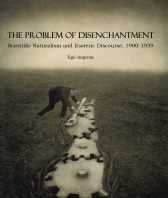Some months back, when I was still in California, Knut Melvær interviewed me for the Norwegian podcast Udannet. The episode is up now. In the unlikely case you have any interest in hearing me stutter on in Norwegian for an hour about my research, the academic study of esotericism, the difficulties of interdisciplinary work, CSR, and related trivia, go check it out. (Bonus feature: bizarre nervous giggling at the 9’50 mark, in response to the question: “But what do esotericism scholars really find out?” – I did have an answer in the end though, phew).
Review symposium on “The Problem of Disenchantment”
The Journal of Religion in Europe has just published a review symposium on my book, The Problem of Disenchantment (2014). I’m excited to say that it contains critical reflections from three world-class scholars of religion, along with my own response. Hans Kippenberg, a well-known expert on Weberian approaches to the history of religion, evaluates some of the book’s claims in light of a broader reading of Weber’s oeuvre. Willem Drees, one of the leading figures in the “religion and science” field, takes a closer look at some of the points I made about the new natural theologies that emerged in the early twentieth century – specifically their relation to esotericism and “heterodoxy”. Finally, Ann Taves, a leading American scholar of religion working with (among other things) the cognitive science of religion and the notion of experience, continues a discussion that she and I have been having over the past few years regarding the perception, explanation and interpretation of “events” (for more on this, check out our forthcomming co-authored target article in Religion, Brain, & Behavior) . If you’ve got access, go ahead and read them!
While you are at it, you may also be interested in checking out my response, which I called “The Disenchantment of Problems: Musings on a Cognitive Turn in Intellectual History” (non-final version uploaded here, and added to my Academia page for easy access).
New blog at Occult Minds
When I launched the website of my current postdoctoral research project (“Occult Minds: Esotericism as Cognition and Culture”) last August, it was with the intention of keeping a research blog that would be updated fairly regularly. Not much has happened on the blog front the past six months (let’s just say that I needed to prioritize my writing tasks), but now I have updated it with a post that looks at some precursors for the aim of the project: which is to bring together the study of esotericism and the cognitive science of religion. Spoiler: There really isn’t much to find – but esotericism scholars can learn from some of their colleagues studying Gnosticism.
I hope to update the Occult Minds blog more frequently in the coming months, so stay tuned for further updates.
Launching “Occult Minds”: official website of my postdoctoral research project
It has been more than six months since I left Amsterdam for California, and some have maybe been wondering what I’m up to. To finally prove that I’m not just surfing all day, here, at long last, is the website of my postdoctoral research project, Occult Minds. The website contains quite a bit of information already, about the project itself and some of the directions it is taking. It also includes a blog, where I will be posting updates on the project as well as reviews and reflections on relevant studies. The first post contains some reflections on a book with a title very close to my project: Christopher Lehrich’s The Occult Mind: Magic in Theory and Practice (Cornell UP, 2007). With a music metaphor, it is a form of counterpoint to what I am aiming to do: there are harmonies between the two, but the rhythms and structures of the individual melodies are so different they could belong to separate musical genres.
A fresh take on “magic” on the Societas Magica blog

Bodies, brains, magic, culture.
Maurice Merleau-Ponty’s new uses.
Some time ago I mentioned that Societas Magica were going to launch a blog. Well, that happened soon after, and I did not pay attention. So, quite overdue, here is the link to this new and valuable addition to the esoteric-et-cetera blog community.
So far there is only one post, but it is also a very good one that sets a high standard: “Ritual Magic and Conjured Bodies: A Philosophy and Methodology” by Damon Lycourinos. I was impressed with Damon’s paper at ESSWE4, on the use of Merleau-Ponty and embodiment theory in the analysis of contemporary ritual magical practice. In his first blog post at Societas Magica, Damon continues this exploration and offers, I think, some very valuable and stimulating reflections on how to theorise magical practice.
In particular, I couldn’t agree more with his complaint that talk about the body and embodiment in “postmodern” theorising has in fact not taken the body seriously at all – and that this could be remedied by returning to the phenomenology of Merleau-Ponty:
Synthesis: Esotericism & the Sciences
 There’s a conference in Amsterdam this coming Monday (April 29), on the relationship between esotericism and the sciences. And art, and music, and literature, and other things. “Synthesis: Esotericism & the Sciences” is described as a young scholars conference, which means that it has been organized entirely by a crew of enthusiastic and energetic MA students, and primarily caters to scholars at a very early stage in their careers (i.e. graduate and post-graduate students). Check out the exquisitely looking website for more information on the event, and an overview of the program. In addition to eight papers and several artistic and musical intermezzos, the show starts with a keynote lecture by yours truly. The title of my keynote is “A Nihilist’s View of Scientific Meaning-Making: Analytical Approaches to Synthesizing Minds“. I attach the abstract below:
There’s a conference in Amsterdam this coming Monday (April 29), on the relationship between esotericism and the sciences. And art, and music, and literature, and other things. “Synthesis: Esotericism & the Sciences” is described as a young scholars conference, which means that it has been organized entirely by a crew of enthusiastic and energetic MA students, and primarily caters to scholars at a very early stage in their careers (i.e. graduate and post-graduate students). Check out the exquisitely looking website for more information on the event, and an overview of the program. In addition to eight papers and several artistic and musical intermezzos, the show starts with a keynote lecture by yours truly. The title of my keynote is “A Nihilist’s View of Scientific Meaning-Making: Analytical Approaches to Synthesizing Minds“. I attach the abstract below:








